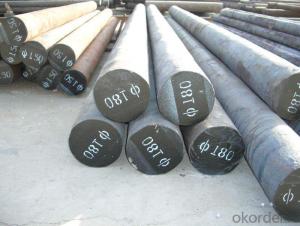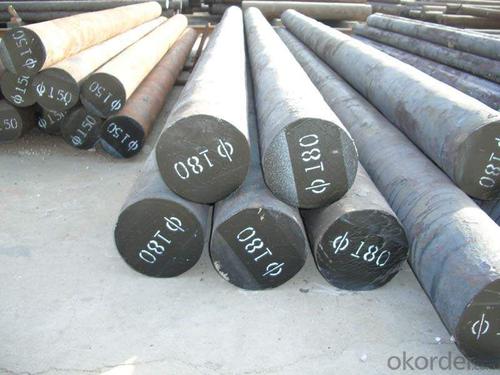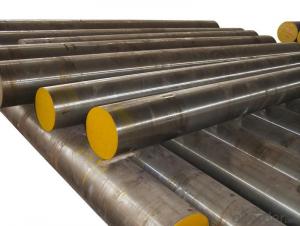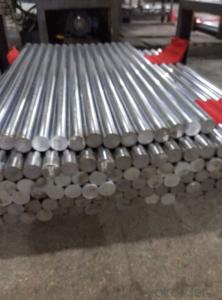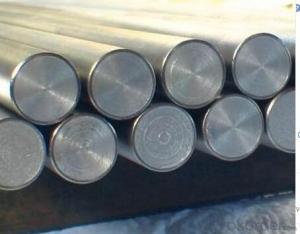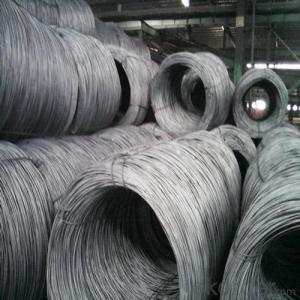Corrosion Resistance Hot Rolled Bearing Steel SAE 52100
- Loading Port:
- China main port
- Payment Terms:
- TT OR LC
- Min Order Qty:
- 500 m.t.
- Supply Capability:
- 10000 m.t./month
OKorder Service Pledge
OKorder Financial Service
You Might Also Like
Size of 52100 Carbon Alloy Steel | ||||||||
Round bar | Diameter(mm) | Length (mm) | ||||||
20~800 | 3000~9000 | |||||||
Plate | Thickness(mm) | Width (mm) | Length (mm) | |||||
Max:800 | Max:2200 | Max:9000 | ||||||
The specification can be customized. | ||||||||
Chemical Compositons | ||||||||
Grade | C | Si | Mn | P | S | Cr | Mo | Ni |
GCr15 | 0.95-1.05 | 0.15-0.35 | 0.25-0.45 | ≤0.025 | ≤0.025 | 1.40-1.65 | ≤0.10 | ≤0.30 |
E52100 | 0.93-1.05 | 0.15-0.35 | 0.25-0.45 | ≤0.025 | ≤0.015 | 1.35-1.60 | ≤0.10 | ≤0.25 |
SUJ2 | 0.95-1.10 | 0.15-0.35 | ≤0.50 | ≤0.025 | ≤0.025 | 1.30-1.60 | ≤0.08 | ≤0.25 |
100Cr6 | 0.93-1.05 | 0.15-0.35 | 0.25-0.45 | ≤0.025 | ≤0.015 | 1.35-1.60 | 0.10 | |
Features of 52100 alloy steel | ||||||||
1, High carbon alloy steel | ||||||||
2, High degree of hardness | ||||||||
3, Good compressive strength and abrasion resistance | ||||||||
Typical Applications | ||||||||
1, Taps, gauges, swaging dies, ejector pins | ||||||||
2, Ball and roller bearings | ||||||||
3, Machine parts and for press tools | ||||||||
- Q: What are the main applications of special steel in the marine sector?
- Special steel is widely used in the marine sector for various applications. Some of the main applications include the construction of ship hulls, offshore structures, and marine equipment. The high strength and corrosion resistance properties of special steel make it ideal for withstanding the harsh conditions and corrosive environment of the sea. It is also used in the manufacturing of propeller shafts, marine engine components, and marine pipelines, ensuring durability and reliability in marine operations. Overall, special steel plays a crucial role in enhancing the safety, efficiency, and longevity of marine structures and equipment.
- Q: How is special steel used in the packaging supply chain?
- Special steel is commonly used in the packaging supply chain for manufacturing various types of packaging machinery and equipment. It is utilized to create robust and durable components such as blades, cutters, molds, and dies that are essential for shaping, cutting, and forming packaging materials. The strength, hardness, and wear resistance properties of special steel make it ideal for withstanding the high pressures and repetitive movements involved in the packaging process. Additionally, special steel is also used in the construction of storage racks and shelves, ensuring the safe and secure storage of packaged goods throughout the supply chain.
- Q: What are the factors that affect the weldability of special steel?
- The factors that affect the weldability of special steel include the chemical composition of the steel, the presence of impurities or alloying elements, the heat treatment history, the thickness of the steel, the welding process and technique used, and the pre-weld and post-weld treatments.
- Q: How does the alloying elements affect the properties of special steel?
- The alloying elements have a significant impact on the properties of special steel. These elements, such as chromium, nickel, and molybdenum, can enhance corrosion resistance, increase strength and hardness, improve high-temperature performance, and promote the formation of specific microstructures. By carefully selecting and controlling the alloying elements, manufacturers can tailor the properties of special steel to meet specific application requirements, making it suitable for various industries such as automotive, aerospace, and construction.
- Q: What are the different methods for improving the toughness of special steel?
- There are multiple approaches that can be utilized to enhance the toughness of special steel. Among the most effective techniques is the utilization of alloying. By incorporating specific elements like nickel, chromium, or molybdenum into the steel composition, the toughness can be greatly enhanced. These alloying elements aid in increasing the strength and resistance to cracking and fracture. Another method involves employing heat treatment processes. For instance, one can utilize quenching and tempering to improve the toughness of the steel. Quenching entails rapidly cooling the steel from a high temperature to room temperature, resulting in a hardened structure. Subsequently, tempering takes place, where the steel is reheated to a precise temperature and then slowly cooled. This process helps alleviate internal stresses and enhance the toughness of the steel. Furthermore, refining the microstructure of the steel can also amplify its toughness. Techniques like grain refinement, which encompass reducing the size of the grains in the steel, can lead to improved toughness. This is due to the fact that smaller grains hinder the propagation of cracks, making the steel more resistant to fracture. Lastly, special steel can undergo processes such as shot peening or surface hardening to augment its toughness. Shot peening involves bombarding the steel's surface with tiny metallic or ceramic particles, inducing compressive stresses and enhancing resistance to crack initiation. Surface hardening techniques like carburizing or nitriding can generate a hardened layer on the steel's surface, increasing its toughness and wear resistance. In conclusion, the various methods for enhancing the toughness of special steel encompass alloying, heat treatment processes, microstructure refinement, and surface treatments. Each of these techniques can be customized to meet the specific requirements of the steel and achieve the desired level of toughness.
- Q: How does special steel perform in cryogenic conditions?
- Special steel performs well in cryogenic conditions. Its low temperature resistance allows it to maintain its strength, toughness, and ductility even at extremely cold temperatures. This makes it suitable for various applications in cryogenic industries, such as liquefied natural gas (LNG) storage tanks, aerospace components, and medical equipment. Additionally, special steel's resistance to brittleness and corrosion ensures its reliability and durability in these challenging environments.
- Q: What are the different surface treatments used for special steel?
- There are several surface treatments commonly used for special steel, including galvanization, nitriding, carburizing, and plating. Galvanization involves applying a protective zinc coating to prevent corrosion. Nitriding is a heat treatment process that enriches the surface of the steel with nitrogen, enhancing hardness and wear resistance. Carburizing involves introducing carbon into the steel's surface, creating a hardened layer. Plating, on the other hand, involves covering the steel with a thin layer of another metal, such as chrome or nickel, for improved aesthetics and corrosion resistance.
- Q: What are the different methods of protecting special steel against corrosion?
- There are several methods available for protecting special steel against corrosion. Some of the commonly used methods include: 1. Coating: Applying a protective coating on the surface of the steel is one of the most effective ways to prevent corrosion. This can be done through various techniques such as hot-dip galvanizing, electroplating, or painting. Coatings act as a barrier, preventing moisture and corrosive substances from coming into contact with the steel. 2. Cathodic protection: This method involves the use of a sacrificial anode or an impressed current to protect the steel. In sacrificial anode cathodic protection, a more reactive metal is connected to the steel, which corrodes instead of the steel. On the other hand, impressed current cathodic protection uses an external power source to provide a continuous flow of electrons, preventing the corrosion process. 3. Alloying: Special steel can be alloyed with specific elements to enhance its resistance to corrosion. For example, stainless steel contains chromium, which forms a passive oxide layer on the surface, protecting it from corrosion. Similarly, adding elements such as nickel, molybdenum, or copper can improve the corrosion resistance of the steel. 4. Passivation: Passivation is a chemical process that involves treating the steel with an acid solution to remove any impurities from the surface. This process promotes the formation of a protective oxide layer, which prevents further corrosion. 5. VCI (Volatile Corrosion Inhibitors): VCI compounds are chemicals that release vapors, which form a protective layer on the surface of the steel. This layer acts as a barrier against moisture and corrosive substances, effectively preventing corrosion. 6. Proper maintenance and cleaning: Regular maintenance and cleaning of the steel surface can significantly extend its lifespan and prevent corrosion. Removing dirt, debris, and corrosive substances from the surface reduces the likelihood of corrosion. It is important to note that the choice of method depends on various factors such as the type of steel, the environment it will be exposed to, and the expected lifespan. Consulting with corrosion experts or engineers can help determine the most suitable method for protecting special steel against corrosion.
- Q: How is ultra-high-strength steel used in the construction industry?
- Ultra-high-strength steel is used in the construction industry for various applications. It is commonly used in the construction of high-rise buildings, bridges, and other structures that require high load-bearing capacity and resistance to extreme conditions. The unique properties of ultra-high-strength steel, including its exceptional strength and durability, allow for the creation of lighter and more efficient structures. This steel is often used in critical components such as beams, columns, and trusses, enabling the construction of taller and more complex structures with enhanced safety and longevity.
- Q: What properties make special steel unique?
- Special steel, also referred to as alloy steel, possesses distinct characteristics that differentiate it from other forms of steel. Firstly, special steel stands out due to its remarkable strength and hardness. It is specifically designed to resist deformation, making it ideal for applications that demand robust materials. Whether in the construction, automotive, or aerospace sectors, special steel provides the necessary durability and reliability. Another noteworthy attribute of special steel is its exceptional ability to resist corrosion. By incorporating certain alloying elements like chromium, nickel, or molybdenum, this type of steel becomes highly resistant to rust and other forms of corrosion. Consequently, special steel finds extensive use in marine environments, chemical plants, and oil and gas industries where exposure to harsh conditions is prevalent. Moreover, special steel displays excellent heat resistance. It can endure high temperatures without compromising its strength or structure, rendering it suitable for use in extreme heat environments such as power generation or furnace components. This property allows special steel to be employed in critical situations where other materials may fail or deteriorate. Special steel is renowned for its versatility and adaptability as well. Through the incorporation of various alloying elements and heat treatment processes, it can be customized to meet the specific requirements of different industries. This flexibility enables the creation of specialized alloys with unique properties, such as enhanced machinability, wear resistance, or improved magnetic properties, catering to a wide range of applications. In conclusion, the exceptional strength and hardness, superior corrosion resistance, excellent heat resistance, and adaptability of special steel make it an invaluable material in numerous industries. It enables the development of innovative and reliable products that meet specific industry needs.
Send your message to us
Corrosion Resistance Hot Rolled Bearing Steel SAE 52100
- Loading Port:
- China main port
- Payment Terms:
- TT OR LC
- Min Order Qty:
- 500 m.t.
- Supply Capability:
- 10000 m.t./month
OKorder Service Pledge
OKorder Financial Service
Similar products
Hot products
Hot Searches
Related keywords
